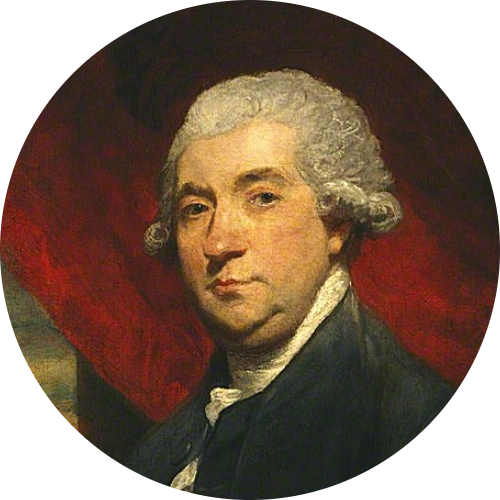Andrew Erskine was the youngest son of Alexander Erskine (d. 1756), 5th Earl of Kellie, and Janet Pitcairn (d. 1775). As such, he was also the younger brother of Elizabeth, Anne, Jenny, Archibald and Thomas Alexander Erskine. In 1762-63 he was a Lieutenant in the 71st regiment (despite Boswell's referring to him as the captain in his journal). When the 71st regiment was broke (disbanded) in 1763, Erskine transferred to the 24th regiment, where he did rise to the rank of Captain. He lived with his sister Elizabeth (from 1768, Lady Colville) at Drumsheugh, Edinburgh for most of his adult life.
Often in financial difficulties, he drowned himself in the River Forth in 1793. Apparently, in his later days, Andrew Erskine was also a friend of poet Robert Burns.
Erskine was himself an able poet, and in 1760-2 edited the two volumes of A Collection of Original Poems, by [the Rev. Mr. Blacklock and other] Scotch gentlemen, published by Alexander Donaldson. In June 1762 he had Odes to Indolence and to Impudence published by James Dodsley. On February 6th, 1764 his farce She's not Him, and He's not Her was first performed at the Canongate in Edinburgh, and subsequently published by Donaldson. This was "the piece of the dramatic farcial kind" which Dempster referred to in a letter to Boswell (dated May 25th, 1764) - according to the letter Dempster "asked Donaldson, the printer of it, how it took. "Oh, very well, Sir, very well I can assure you; it was not damned till the second night."."
In 1773 was published Erskine's poems Town Eclogues. The individual Eclogues were entitled The Hangman, The Harlequin, The Streetwalker and The Undertaker. Ca. 1788 he published (with a Walter Ross) the pamphlet To the Revolution Club, which was "a tory satire against the Scottish whigs enthusiasm for the Glorious Revolution" (according to the National Library of Scotland).
In James Taylor's The Great Historical Families of Scotland (1889) it can be read that Erskine's "vets de société and witty conversation are still traditionally remembered in Scotland".
Charles Rogers wrote about Erskine in Boswelliana (1874) that "he was an extraordinary pedestrian, and walked nearly every morning [from Drumsheugh] to Queensferry, about ten miles distant, where he breakfasted at Hall's Inn. He dispensed with attendance, and when he had finished his repast, left payment under a plate. He was of a tall, portly form, and to the last wore gaiters and a flapped vest. Though satirical with his pen, he was genial and humorous in conversation. He was an early admirer and occasional correspondent of the poet [Robert] Burns. [...] His habits were regular, but he indulged occasionally at cards, and was partial to the game of whist. Having sustained a serious loss at his favourite pastime he became frantic, and thew himself into the Forth, and perished. [...] In a letter to Mr. Thomson dated October, 1791, Burns writes that the tidings of Erskine's death had distressed and "scared" him". (Boswelliana, p. 23-24)
James Boswell was introduced to Andrew Erskine through their mutual acquaintance George Dempster in 1761. When Boswell was about to depart on the Northern Circuit with his father, Dempster saw it fit to introduce the two young men to each other, and so wrote Boswell a letter of introduction to give to Erskine. When James and Alexander Boswell arrived in Inverness, James immediately rode further north to Fort George, where Erskine was stationed, and they immediately took a liking to each other.
From October 30 to November 3, 1762, Boswell stayed with Andrew and his sisters Elizabeth, Anne, and Jenny at Kellie. He described Andrew as "a tall black man with a great sagaciousness of countenance. He has an awkward bashfulness amongst strangers, but with his friends is easy and excellent company. He has a richness of imagination, a wildness of fancy, a strength of feeling, and a fluency of expression which render him a very fine poet. He has a great deal of humour and simplicity of manners. He has a turn for speculation and has none of the common notions of mankind".
Erskine arrived in London with his sisters Elizabeth and Anne, and Jean Dempster, about two weeks after Boswell on Dec 1, 1762. He was one of Boswell's frequent companions during the next few months. He is also the first person mentioned in the London Journal (before Boswell's departure from Edinburgh on November 15, 1762).
Erskine played a prank, with George Dempster, on Boswell in 1763 (LJ150263) for which Boswell considered never forgiving them. A few months later Boswell explained to Erskine the difference between friendship and comradeship (LJ 07/07-63), telling Erskine that their relationship was to be considered the latter. According to Boswell, Erskine seemed to agree, despite being taken somewhat aback initially.
Boswell had 28 small pieces published in the second volume of A Collection of Original Poems by Scotch gentlemen (1761/2?, ed. by Erskine), which he also co-edited due to Erskine's duties in the military. In 1763 Boswell and Erskine published their mutual correspondence, to the chagrin of Boswell's father and generally bad reviews. Erskine was also co-author, with Boswell and Dempster, of Critical Strictures on the New Tragedy of 'Elvira', written by Mr. David Malloch (1763).
On December 9, 1762, Erskine warned Boswell not to quote private conversations to other people. Boswell admitted to having that habit, but it became quite a problem in his later years.
When Boswell returned to Scotland in 1766, he and Erskine resumed their friendship, and they met, dined, had tea together etc. fairly frequently whenever Boswell was in Edinburgh. In later years they seem to have grown somewhat apart.
On a side note, Andrew Erskine and James Boswell were related, although distantly. Erskine's great-great-great-great-great-grandparents John, 5th Lord Erskine (d. 1552) and Margaret Campbell were Boswell's great-great-great-great-grandparents.
